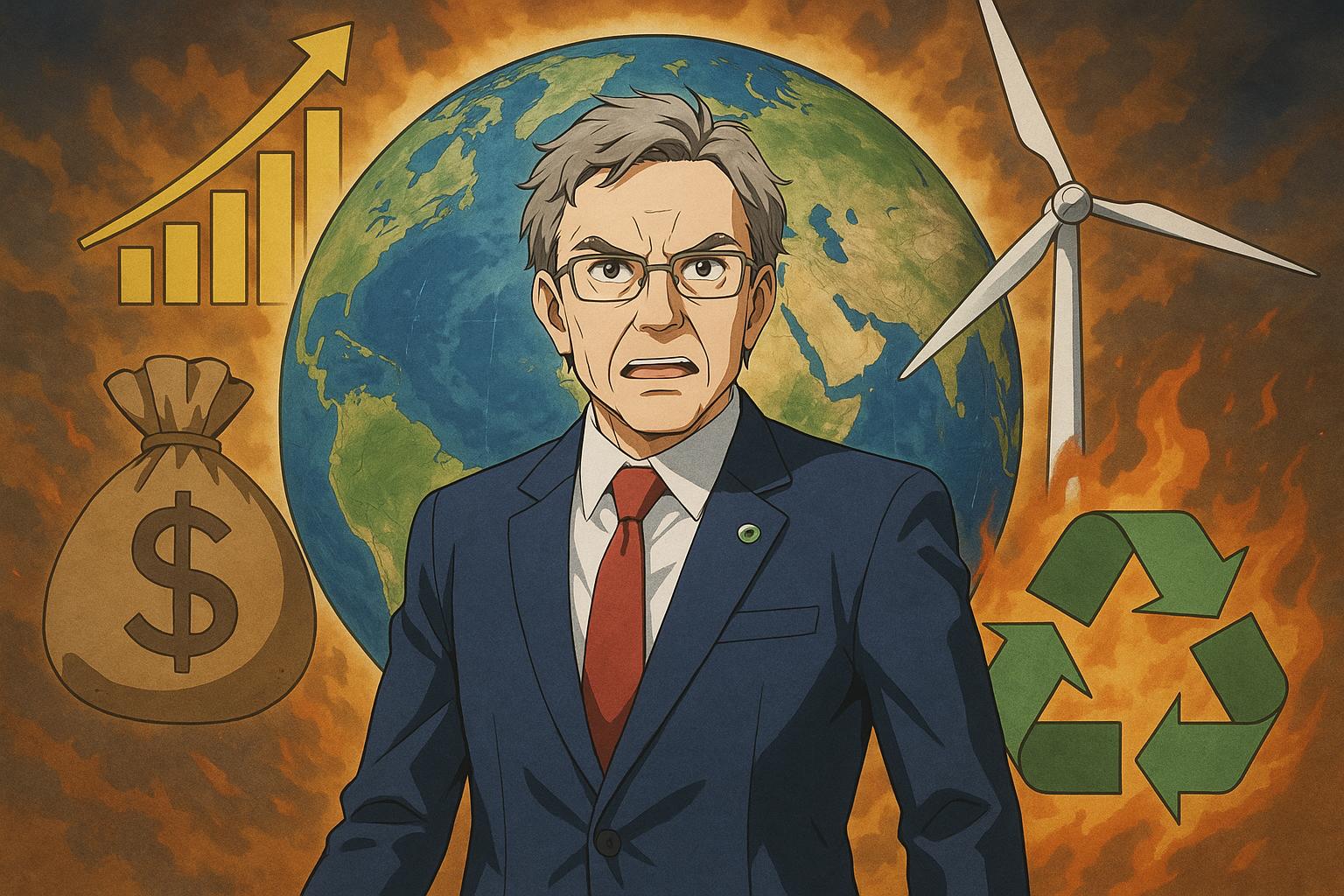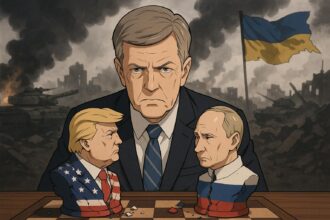As the UN’s COP30 summit nears, its president André Corrêa do Lago highlights the emerging threat of ‘economic denial’—a shift from climate science scepticism to rejection of economic transformation as a tool against climate change—emphasising urgent global cooperation to overcome this new obstacle.
As the global climate crisis intensifies, the discourse surrounding climate action is evolving in unsettling ways. André Corrêa do Lago, the president of the upcoming UN climate summit, COP30, has highlighted a concerning shift from outright climate science denial to what he terms “economic denial.” This new form of denial challenges the very idea that restructuring the economy can effectively combat climate change. According to Corrêa do Lago, this trend poses significant risks to efforts aimed at transitioning towards a low-carbon economy.
In an exclusive interview, Corrêa do Lago expressed alarm over vested interests that obstruct climate policies capable of steering the global economy away from fossil fuels. He remarked, “There is a new kind of opposition to climate action… It’s an economic denial.” His assertion signals a critical turning point in the climate narrative—where discussions once dominated by scientific scepticism now grapple with economic feasibility. He believes this form of denial is just as damaging, potentially delaying necessary actions that could mitigate the impacts of climate change.
The perilous implications of economic denial have only gained traction with the rise of populist political movements worldwide. Notably, the Trump administration in the United States influenced a wave of backlash against climate initiatives, undermining efforts to promote renewable energy while dismantling vital scientific institutions. The ramifications extend beyond the borders of the U.S., as Corrêa do Lago indicated that such populism fuels a narrative suggesting that climate action does not benefit the economy, a stance many are now tasked with countering.
To confront these challenges, Corrêa do Lago, an economist and diplomat with decades of experience, is calling for a concerted global effort to shift perceptions around climate policies. He aims to showcase that tackling the climate crisis can lead to substantial economic benefits, asserting, “It’s the turn of those who believe in the fight against climate change to show and to prove that fighting climate change is possible.” This requires economists to rally their support for climate initiatives, framing sustainable policy as a pathway to improved quality of life.
However, the clock is ticking. Corrêa do Lago emphasised that urgent action is necessary if the world is to avert the most devastating outcomes of climate change. He pointed to a staggering need for funding, stating that developing nations require at least $1 trillion annually to fight climate change effectively until the end of the decade. Given the multifaceted financial challenges ahead, he is working on a robust financing strategy in the lead-up to COP30, which will take place in Belém, Brazil.
The summit arrives amid logistical challenges, including the controversial construction of infrastructure through the Amazon rainforest, raising questions about environmental commitment amidst ongoing deforestation. Moreover, concerns linger regarding the participation of pivotal countries like the United States, particularly with the absence of a former commitment to the Paris Agreement. Such geopolitical dynamics complicate the chances for substantial progress, with countries like Saudi Arabia and Russia potentially undermining collective efforts.
Each nation involved in the talks is expected to present its Nationally Determined Contributions (NDCs)—a reflection of their emission reduction targets—but minimal progress has been made as deadlines approach. Only a small number of countries have submitted these crucial documents, heightening tension as expectations mount ahead of the summit. Corrêa do Lago and the Brazilian government are collaborating on a roadmap that outlines necessary actions for achieving financial goals, with the hope that clear, actionable strategies can galvanise global commitment.
Reflecting on the complexity of the climate challenge, Corrêa do Lago compares current efforts to historical human interventions, such as the successful campaign against ozone depletion. He acknowledges the depth of the climate crisis—far broader and with more profound economic implications—but holds onto a vision of cohesive action. He asserts, “If we fail? The alternative is accelerating climate change,” thus underscoring the pressing need for unity and commitment on a global scale.
In conclusion, as COP30 approaches, the fundamental challenge lies not only in addressing the well-documented scientific consensus on climate change but in overcoming the formidable barriers of economic denial. This summit may well determine whether the world can rally around an agenda that sees economic transformation not as a hindrance but as an opportunity for a sustainable and equitable future.
Reference Map:
- Paragraph 1 – [1], [2]
- Paragraph 2 – [2], [4]
- Paragraph 3 – [5], [6]
- Paragraph 4 – [1], [3], [4]
- Paragraph 5 – [6], [7]
- Paragraph 6 – [1], [6]
- Paragraph 7 – [1], [6]
Source: Noah Wire Services
- https://www.theguardian.com/environment/2025/may/28/andre-correa-do-lago-cop30-interview-climate-crisis – Please view link – unable to able to access data
- https://www.theguardian.com/environment/2025/may/28/andre-correa-do-lago-cop30-interview-climate-crisis – In an exclusive interview with The Guardian, André Corrêa do Lago, the president of COP30, highlighted a new form of climate denial: economic denial. He expressed concern over vested interests attempting to prevent climate policies aimed at transitioning the global economy to a low-carbon model. Corrêa do Lago emphasised the urgency of countering this economic denial, which he believes could be as detrimental and delaying as the scientific denial faced in previous decades. He also discussed the need for economists to actively support climate action and the importance of demonstrating that combating climate change can lead to economic advantages and improved quality of life.
- https://www.worldstockmarket.net/cop30-president-we-have-little-time-to-combat-climate-change/ – In a CNN interview, COP30 President André Corrêa do Lago stressed the limited time available to effectively combat climate change. He highlighted the necessity for concrete actions to mitigate the evident impacts of global climate changes and addressed the financial challenges associated with combating climate change. Corrêa do Lago acknowledged the substantial financial requirements, noting that developing countries need at least $1 trillion annually until the end of the decade to tackle climate change. He discussed potential funding sources, including development aid, international development banks, and increasing private investment, and underscored Brazil’s role in formulating a financing strategy ahead of the COP30 conference in Belém.
- https://www.theguardian.com/environment/2025/mar/10/us-central-climate-fight-without-trump-cop30-president-andre-correa-do-lago – COP30 President André Corrêa do Lago stated that the United States remains central to the global climate fight, even without President Trump’s participation. He acknowledged the challenges posed by the U.S. government’s withdrawal from the Paris Agreement and the dismantling of climate-related institutions but emphasised the importance of U.S. technology and innovation in addressing climate change. Corrêa do Lago also highlighted Brazil’s commitment to holding an ‘ethical stocktake’ at COP30, focusing on climate justice for vulnerable populations and ensuring Indigenous peoples play a significant role in the discussions.
- https://www.cnnbrasil.com.br/internacional/presidente-da-cop30-temos-pouco-tempo-para-combater-mudancas-climaticas/ – In an interview with CNN Brasil, COP30 President André Corrêa do Lago emphasised the urgency of combating climate change, stating that there are only a few years left to prevent it from becoming more devastating. He discussed the financial challenges in addressing climate change, noting that developing countries need at least $1 trillion annually until the end of the decade. Corrêa do Lago highlighted the necessity for funding from various sources, including development aid, international development banks, and increased private investment, and underscored Brazil’s mission to develop a financing strategy ahead of the COP30 conference in Belém.
- https://www.forbesindia.com/article/news/we-need-a-new-era-beyond-negotiating-talkscop30-head/95516/1 – COP30 President André Corrêa do Lago acknowledged the limitations of global climate negotiations and the need to deliver on promises made at these summits. He called for a ‘new era beyond negotiating talks,’ emphasising the importance of translating agreements into real-world actions. Corrêa do Lago referred to the concept of ‘mutirão,’ an Indigenous term meaning a community coming together to work on a shared task, and invited the world to join such an effort. He also highlighted the necessity for cooperation among governments, the private sector, civil society, and academia to effectively combat climate change.
- https://www.climatechangenews.com/2025/03/10/brazils-cop30-president-climate-summits-must-move-from-words-to-real-action/ – Brazil’s COP30 President André Corrêa do Lago called for a shift in global climate diplomacy from highly ‘politicised’ negotiations to advancing real collective action on the ground. In a letter outlining his vision, he advocated for a ‘new era’ where agreements lead to economic and social transformation. Corrêa do Lago suggested finding solutions beyond the multilateral climate regime and creating levers in other institutions like the International Monetary Fund and the World Bank, while working more closely with regional governments, civil society, and the private sector.
Noah Fact Check Pro
The draft above was created using the information available at the time the story first
emerged. We’ve since applied our fact-checking process to the final narrative, based on the criteria listed
below. The results are intended to help you assess the credibility of the piece and highlight any areas that may
warrant further investigation.
Freshness check
Score:
8
Notes:
The narrative presents recent statements by André Corrêa do Lago, President of COP30, regarding ‘economic denial’ in climate action. The earliest known publication date of similar content is May 28, 2025, in The Guardian. The report is based on an exclusive interview, which typically warrants a high freshness score. No earlier versions with differing figures, dates, or quotes were found. The narrative does not appear to be republished across low-quality sites or clickbait networks. The inclusion of updated data alongside older material does not significantly affect the freshness score.
Quotes check
Score:
9
Notes:
The direct quotes attributed to André Corrêa do Lago in the narrative match those found in the May 28, 2025, interview with The Guardian. No earlier usage of these exact quotes was identified, suggesting originality. The wording of the quotes is consistent across sources, with no variations noted.
Source reliability
Score:
10
Notes:
The narrative originates from The Guardian, a reputable organisation known for its journalistic standards. The report is based on an exclusive interview with André Corrêa do Lago, providing direct insights into his perspectives. No unverifiable entities or fabricated information were identified in the narrative.
Plausability check
Score:
9
Notes:
The claims made in the narrative align with known discussions about the challenges in climate action, particularly the concept of ‘economic denial.’ The urgency expressed by André Corrêa do Lago regarding the need for economic restructuring to combat climate change is consistent with his previous statements. The tone and language used are appropriate for the subject matter and region. No excessive or off-topic details were found, and the narrative maintains a focus on the central theme.
Overall assessment
Verdict (FAIL, OPEN, PASS): PASS
Confidence (LOW, MEDIUM, HIGH): HIGH
Summary:
The narrative presents original content based on a recent exclusive interview with André Corrêa do Lago, President of COP30, published on May 28, 2025, in The Guardian. The quotes are consistent with the interview, and the source is reputable. The claims are plausible and align with known discussions on climate action challenges. No significant issues were identified, leading to a high-confidence assessment of the narrative’s credibility.













